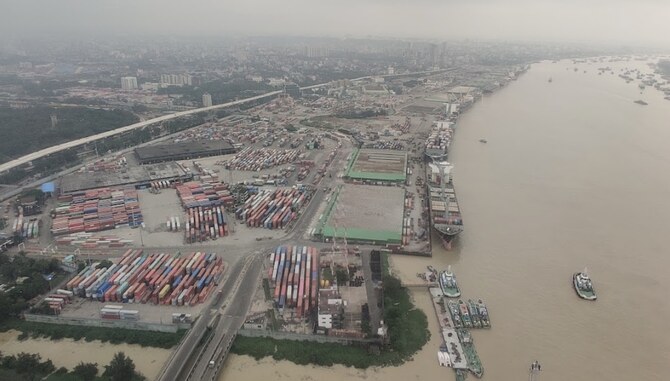KARACHI: As Pakistan gears up for the general election on July 25, Pakistan Muslim League Nawaz-PML-N has promised to build on the foundation of modern energy and logistics infrastructure and take the economy to the next level by enabling an agro-industrial revolution for job creation.
“Our top economic priority will be sustaining growth momentum, focusing on resource mobilization, increasing exports and job creation through industrialization and implementation of CPEC (China-Pakistan Economic Corridor) projects,” Ahsan Iqbal, who served as Minister for Interior and Minister for Planning, Development and Reforms in the last PML-N administration, told Arab News.
Economists and industrialists have given mixed ratings to the PML-N’s five years, deeming the party’s last year in office as the least successful.
PML-N has taken credit for economic growth, which is currently running at a 13-year high, reduced load shedding, low inflation and interest rates, the improved security situation and liquefied natural gas (LNG) imports.
“Deterioration in external account, increasing external debts and liabilities, poor performance of distribution companies, mounting circular debt, failure to privatize and reduce losses of public sector enterprises (PSEs), high reliance on indirect taxation, high fiscal deficit, artificially inflated Pakistan rupee against the USdollar, and less spending on health and education were the areas where PML-N missed its targets”, said Muhammad Sohail, senior analyst and CEO of Topline Securities.
“PML-N has delivered on the 3Es it promised in 2013: Energy, elimination of extremism and the economy. Today, load shedding of 18-20 hours has ended. We have added nearly 11,000MW of new power compared to 18,000MW in 66 years. Peace has returned and GDP growth has increased from 3 percent to 5.8 percent highest in last 13 years. Our failure has been in the export sector due to global economic crisis. However, in the last year exports have shown promising rise,” Iqbal said in a response to a question asking him about PML-N’s record.
However, economists have termed the historic high current account deficit CAD as a major failure of PML-N government.
“During the tenure the quantum of our external loans and liabilities substantially increased. Trade deficit deteriorated our external position which led the current account deficit to an all-time high”, Dr. Hafiz Pasha, senior economist and former finance minister, told Arab News.
“The performance of the PML-N government was a blend of success and failures. The government successfully controlled inflation rate and increased power generation, but failed to upgrade the country’s ageing power supply systems”, Dr. Pasha added.

PMLN- Hits and misses: PML-N’s record, 2013-2018. (Source: Topline Securities)
“We could either go slow on fixing the energy crisis or make fast progress. Going slow would have kept the growth rate low while nearly two million young people enter the job market every year. We followed the accelerated path to fix the energy crisis, which meant one-off imports of machinery. As electricity became available, industry started expanding and modernizing, putting more pressure on imports. These are one-off productive investments and boost our growth,” Iqbal added.
“Exports of textiles and value-added products has reduced drastically — once the share of these items was more then 60 percent, but presently it is far less. The case for refunding exporters has been pending for more than three years. They did not give due attention to small and medium-sized enterprises and water crises were not addressed,” said Dr. Athar Ahmed, senior economist.
Some economists praise the PML-N government’s performance over four years, adding that the last year in power let them down.
“Whatever gains were made during four years in office were lost with double speed last year. They have left with highest ever debts, an empty treasury, and high spending,” Muzzammil Aslam, senior economist and CEO of EFG-Hermes Pakistan, told Arab News. He added: “They needed a magic wand to cure the economic ills.”
Experts from the worlds of business and trade were frustrated at the lack of progress on the major issue of export refund.
“Our chronic problem of refund was UN?resolved. The cost of production in Pakistan is high compared to other countries, something which was not addressed adequately”, said Ghazanfar Bilour, President of the Federation of Pakistan Chambers of Commerce and Industry (FPCCI).
The China-Pakistan Economic Corridor (CPEC) is another initiative that the PML-N takes credit for, deeming it to be a game-changer for Pakistan.
“With the PM-N government, there will be swift and fast implementation of CPEC projects as PML-N government has seen it grow from inception. Without PML-N, any other government will have to first educate itself about the background of each project and naturally the momentum will break,” said Ahsan Iqbal, who played a leading role in the implementation of CPEC projects.
In the party manifesto, Shahbaz Sharif, President of PML-N, recently promised to increase annual GDP growth rate to over 7 percent and reduce the budget deficit to below an average of 4 percent of GDP, bring industrial growth to between 8 and 10 percent, and create two million jobs.

























